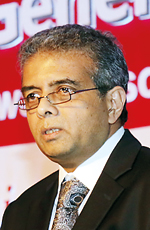Private sector needs to work collectively to lift SL’s growth

Dr Hans Wijayasuriya.
In times of uncertainties, the private sector should have the mindset to change as Sri Lanka moves forward into the 2020-25 period to an exponential era of change.
This is the idea Dr. Hans Wijayasuriya, Corporate Executive Vice President and Regional Chief Executive of Axiata Group Berhad and newly elected Chairman, Ceylon Chamber of Commerce (CCC) suggested to the private sector business community while addressing the 180th AGM of CCC held last week at the Cinnamon Grand Hotel, Colombo.
He said the need is not to have forbearance for despondency to be the engine of growth of the country’s economy, but to work for a collective effort as they have the capacity to remobilize a growth trajectory at least on par with regional countries. “It is imperative to catalyze a wave of economic resurgence – resurgence which envisioned the return to growth rate of 7.8 per cent within the next five years,” he said.
Rajendra Theagarajah, outgoing Chairman in handing over the reins to the new chairman, said that during his tenure of two years he thoroughly enjoyed as it was quite vibrant and exciting and gave a little bit of his thoughts to the new comers for the first time to the ‘Chambers’. “It is easy to stand outside the glass and throw stones, but this is a fantastic forum and an opportunity to get in and collectively contribute to make the change,” he said.
Envisaging the vision ‘way forward’ of the Chamber, Dr. Wijayasuriya indicated that the private sector, the government and the country at large needs to be resilient while facing numerous challenges and asserted that today the country is a US$90 million product within a set of 10 comparable regional countries, comprising all SAARC nations plus Indonesia and Malaysia from ASEAN. The economy is ranked the fourth smallest among them and the country’s growth rate is the lowest among those 10 at 3.7 per cent.
Sri Lanka is highly threatened by sinister clouds of extremism and radicalisation which uncontrolled will fracture the unity and collective momentum of the economy and the future of the economy is “what we make of it”, he noted. He placed Sri Lanka in a leading position in terms of growth, competitiveness social development indices relative to regional peers.
He said the country is blessed with highly talented people and the country’s entrepreneurs have been champions in large, medium and small categories competing globally, regionally and among themselves, while the private sector has collectively faced many economic, political and external turmoil over the last three decades, but were able to dispel these turmoil on all occasions and bounce back to a growth trajectory creating peace and harmony.
He said that the country should with awareness capture the opportunity of the ‘mega trend’, realities and tools of this emerging age and pointed out that there are four transformational trends which he believed will provide them a springboard of leapfrogging. They are: 1) The ethos of inclusion and the thesis of inclusive capitalism, 2) Mega trends around the fourth industrial revolution, 3) The power of eco-system and, 4) The acceleration of pervasive globalization.
The AGM was followed by a panel discussion on ‘The Role of Business in Sustainable Economic Resurgence’ and the panelists were: Ms.Robina Marks, High Commissioner for South Africa in Sri Lanka; Dr. A.T. Ariyaratne, Founder, Sarvodaya Shramadana Movement and Mahesh Amalean, Chairman, MAS Holdings Pvt Ltd with the moderator being Ganaka Herath, Managing Partner, McKinsey Sri Lanka.
Dr. Ariyaratne elaborating his thinking about the economy made a contrary view regarding present day capitalism. He said that land, labour, capital and entrepreneurship taken together, those four things are wrong. It is not land, it is nature. It is not labour, it is human personality. It is not capital, it is social wealth. It is not merely entrepreneurship but science, technology and research. These are the factors that they have brought together.
In his 73 year-old community service career, he said that he was able to adopt 18,000 villages with over 400 schools and provide employment to 175,000. The World Bank studied my thinking and it was indicated in their 1994 report.
But the government did not understand this phenomenon and he could not convince them. “They are idiots then and now because they never thought we possess brains, but they never gave a chance,” he said.


